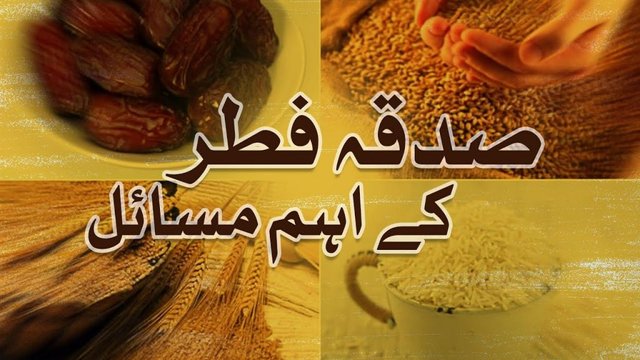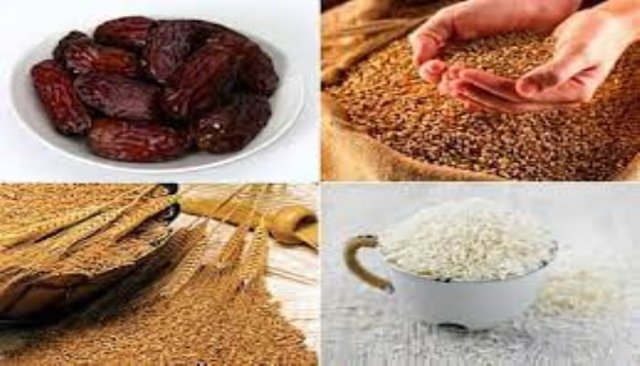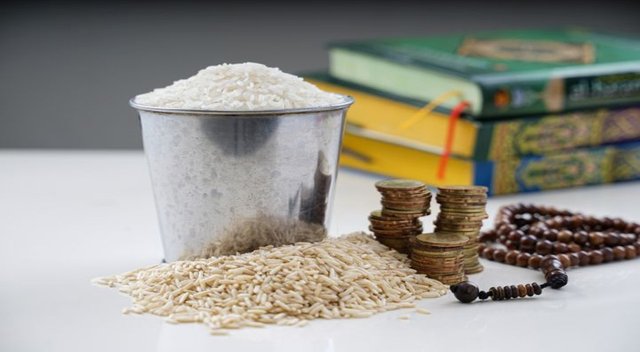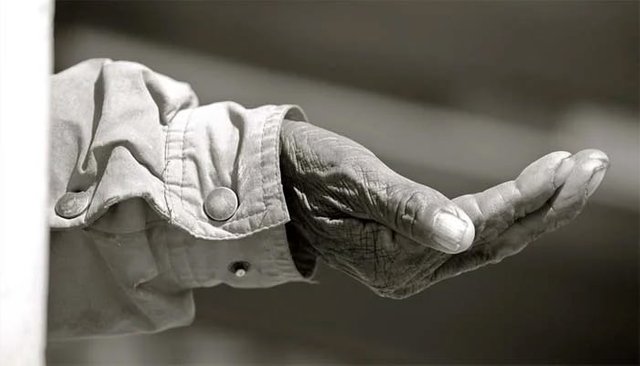Friends, people like you know that Eid al-Fitr is near and every person has to pay Fitrah. Steemit is a big platform. I am going to give information about Fitrah to every Muslim with the help of this platform. Every Muslim can get information about Fitrah, which is our religious duty and it is our duty to convey religious information.

There is a consensus on the obligation of fasting the Fitra (Al-Ijmaa Labin al-Munzir: 49). Sayyidna Abdullah bin Umar narrates that the Messenger of Allah, may God bless him and grant him peace, has made it obligatory for all Muslims, whether they are slaves, free, men, women, young or old, that the amount of Fitra is one Sa'a. It is "dates" or "bare" (Sahih al-Bukhari: 1503/Sahih Muslim: 984) * Warning: * Fitrana is obligatory on a Muslim slave, not on an infidel. Zakat is not obligatory on a slave except Sadaqah al-Fitr (Sahih Muslim: 982). This hadith is common. The hadith of Sayyiduna Abdullah bin Umar RA has specified that ``Abd'' means a Muslim slave. Ubadah (may Allah be pleased with him) narrates: The Messenger of Allah, peace and blessings be upon him, commanded us to give charity at the fitr before the zakat was revealed, but when the zakat was revealed, he did not command us and we did not do it, and we were profiteers. The Prophet (peace be upon him) neither commanded us nor forbade us, but we continued to perform it. Imam Ibn-e-Khuzaimah (2394) and Imam Hakim (1/4100) called it "Sahih" and Hafiz Dhahbi adapted it. Asal al-Mazid (peace be upon him), except that the place of Zakat Al-Maqal and the place of Zakat al-Fitr al-Raqab This hadith does not prove that the Zakat al-Fitr is no longer obligatory, because any increase in worship does not nullify the principle. But it is obligatory (Maalam al-Sunan: 2/214) and it is proven in the hadith from Ibn Abbas in Sunan Abu Dawud that the Holy Prophet (peace and blessings of Allah be upon him) made it obligatory for the fasting person to purify himself and feed the poor from nonsense (Sunan Abu Dawud: 1609) Allama al-Albani has described it as good in the Sahih Sunan of Abu Dawud. This hadith is also explaining the wisdom of the obligatory act of al-Fitrana, that what is lacking in the state of fasting fulfills the al-Fitrana, and this is not stated in the hadith. It happened that the fast is not accepted without the Fitrana.

◆ Time of Sadaqah Fitr
It is better to pay it in the last ten days. If it is done after the Eid prayer, then it will not be Fitrana. Who pays it before prayer, then Zakat is acceptable and whoever pays it After the Salat, it is Sadaqah from the Sahih Abu Dawud, Book of Zakat - Chapter Zakat al-Fitr. The Prophet, peace and blessings of Allah be upon him, prescribed Zakat al-Fitr to cleanse the fasting person from idleness and obscenity and to provide food for the poor and the poor. If he pays this charity, his charity is accepted, and if a person pays charity after prayer, then it is a charity like the posthumous charity.

◆ Sadaqat al-Fitr should be paid by people
Sadaqah al-Fitr is paid by every member of the family, male, female, free, slave, including everyone from infants to Sheikh Fani, no one is exempt. That the Holy Prophet (PBUH) used to pay one Saa of Sadaqat al-Fitr from barley or dates to every person, slave, free, male and female, small and large. One year dates did not grow in Madinah, so he paid Sadaqat Al-Fitr from barley that year (Bukhari Sharif). ) In view of this decree of the Holy Prophet (PBUH), the head of the family will have to pay Sadaqat al-Fitr on behalf of his wife, children, slaves and those needy who have no wealth and he is responsible for their food. Is

Note:
Servants hired for farming, shop keeping or housework are not under the command of slaves.
◆ Charity for orphans and insane
If an orphan or an insane person has wealth, then the Zakat and Sadaqah al-Fitr should be paid from their wealth. Imam Bukhari says: * And see Umar wa Ali wa Ibn Umar wa Jabar Aisha wa Taaws wa Attai wa Ibn Sirin an Yuz. What is the wealth of the orphan, and al-Zuhri said, “The wealth of the madman.” That is, the religion of Hazrat Umar, Hazrat Ali, Jabir, Hazrat Aisha, Tawas Ata, and Ibn Sirin is that Zakat should be given from the property of an orphan, and Imam Zahri says that Zakat should be given from the property of a madman. If so, then the same is the order of Sadaqat al-Fitr, so Sadaqat al-Fitr will be taken from their wealth. Yes, if these people are in need and have no wealth, then the person who provided for their food and food should pay Sadaqat Al-Fitr on their behalf. He has taken responsibility for the management because it has been mentioned in a hadith, although it is weak Adoo Sadaqat Al-Fitr Amman Tamounun (Daraqtani, Bayhaqi / Fateh Al-Bari, Sabal Salam), that is, pay Sadaqat al-Fitr on behalf of those whose expenses you have endured
◆ The poor should also pay Sadaqat al-Fitr
According to some imams, Sadaqah al-Fitr is obligatory only on the rich and not on the poor, and this is the religion of the Hanafis.
On the contrary, according to other imams and muhadditheen, it is not necessary to have a teacher for the obligation of sadaqat al-fitr, but sadaqat al-fitr is obligatory on every person who has food for one day and one night in addition to sadaqat al-fitr, because the purpose of sadaqat al-fitr is for those who Just as the Shariah (peace and blessings of Allah be upon him) has stated that it should provide food for the poor and the poor, in the same way, he has also said that it should make the fast clean and free from falsification and filth, and the purification of the fast for both the rich and the poor. It is necessary for this. Also, the hadiths which prove the obligation and duty of Sadaqah al-Fitr have not made any distinction between the rich and the poor, but in the hadiths, both the rich and the poor have been clearly ordered to pay Sadaqah al-Fitr, so Abu Dawud It is: Amma Ghanimukum Fayuzkiyya Allah wa Amma faqirukum Fayraddaa Allahu Alaihi Aksharmu Mimma Itaaha That is, every rich and poor Muslim should pay Sadaqah al-Fitr. And Allah will give more than what the fakir gives Allah will restore his home (and his fasts will also be purified). According to this hadith, Imam al-Khattabi writes in Abu Dawud's Sharh al-Maalam. If there is enough, it is obligatory to give charity on it, because the Prophet (peace and blessings of Allah be upon him) said that whatever a poor person gives, Allah will return to his house more than that. Imam Shoukani says that this second school of thought is right and correct, and this is the requirement of the Shariah texts (Nil al-Awtar, Taba Misr, p. 257, vol. 4) Fatawa Ulama Hadith / Vol. 7, p. 59-64.
◆ Does the fasting of Ramadan remain suspended between the heavens and the earth until the payment of Al-Fitrana?
It is said that there is a hadith in this regard from the Holy Prophet, but it is weak. Imam Suyuti has attributed it to Ibn Shaheen's encouragement in "Al-Jaami al-Saghir" and Zia has narrated from Jarir bin Abdullah that the Holy Prophet said the Fitrana. Without it, the fasts of Ramadan are not raised towards Allah, but they remain suspended between the earth and the sky. Ibn al-Jawzi quoted in Al-Wahiyat and said that it is not authentic. Muhammad bin Ubaid al-Basri is the Majwal* and Allama Al-Albani also said in "Al-Salsalat Al-Ahadith Al-Zaifah" (Hadith No: 43) after declaring it weak, then if Even if the hadith is authentic, its appearance will indicate that the acceptance of the fasts of Ramadan is suspended until the payment of the Fitrana, so the fasts of the person who does not pay the Fitrana will not be accepted. You said so
◆ Gender of Sadaqah al-Fitr
People can pay Sadaqat al-Fitr from the grains that humans use as food. In the time of the Prophet (peace and blessings of Allah be upon him), they usually ate barley, dates, minqa and cheese, so he ordered the Companions to pay Sadaqat al-Fitr from these items. Hazrat Abu Saeed Khudri says that during the time of the Messenger of Allah, peace and blessings be upon him, we used to give one Saa of food (per person) on the day of Eid-ul-Fitr and at that time our food used to consist of dates, minqa and cheese (Bukhari) and if someone A person does not have grain to pay Sadaqat al-Fitr, as is usually the case of the urban population, so it is not necessary for him to pay Sadaqat al-Fitr by buying grain from the bazaar, but for the year or most of the year, the grain that he has for food. For example, if a person has 10 people in his household and he uses wheat or rice for most of the year, then he must pay 10 sa's in Sadaqah al-Fitr. He should pay the price of wheat or 10 saa of rice according to the market rate, but it is completely inappropriate that his usual food is wheat or rice, but he should pay a small amount of grain or its price in Sadaqat al-Fitr.

◆ * Amount of Sadaqah al-Fitr *
Whatever kind of charity it is, its amount is one Sa'a according to the Shari'ah. This was given by the Messenger of Allah (peace and blessings of Allah be upon him) through ijtihad, he had no evidence, so some other companions refused to accept it and clearly said that we should give the full Sa'a of whatever gender we give in charity. will, because the Prophet (peace be upon him). This was the custom at that time. He said in it that he said: I see that from Samarra al-Sham Madinan is equal to an hour of dates, so the people took it, Abu Saeed said: But I will not take it out.'' Abu Saeed Khudri. It was narrated on the authority of Radiyallahu Anhu that in the presence of the Messenger of Allah, may Allah bless him and grant him peace, we used to pay Sadaqah al-Fitr in the presence of the Messenger of Allah, peace and blessings of Allah be upon him. Even after the peace and blessings of Allah be upon him, our practice remained the same until Hazrat Ameer Muawiya visited for Hajj or Umrah and while giving a sermon on the pulpit said: In my opinion, two saa of Syrian wheat. Half a saa is worth one saa of dates. , so people followed it." I started it, but as long as I am alive, I will do it according to the rulings of the time of the Messenger of Allah, may God bless him and grant him peace. Only one Sa'a (of whatever gender I will give). Two. 318/ Vol. 1) Narrated by Hazrat Abdullah bin Umar (RA).
- The Messenger of Allah, may God bless him and grant him peace, said: Zakat of Fitr is one Saa of dates or one Saa of barley.
(Bukhari Sharif) That is, the Holy Prophet (peace and blessings of Allah be upon him) ordered to pay one Sa'a of dates as Sadaqah al-Fitr. According to Abu Saeed al-Khudri and Abdullah bin Umar, the correct and Shariah amount of Sadaqah al-Fitr, regardless of whether it is paid by any gender, is one saa, that is the reason why they have interpreted it as paying half a saa from wheat. As the will of the people or their own opinion. Yes, in some hadiths of the Sunan, the words Half a Saa of wheat or half a Saa of wheat have also been mentioned, but these hadiths do not reach the basis of argument according to scholars, so this situation is not reliable. There have also been those who gave half-saaa, but none of them are correct.
◆ Research of Saa Nabwi
Saa Nabawi or Saa Ibn Abi Zaib was five pounds and 3.1 pounds, which is equal to 2 sers, 10 chthanaks and 4 mashas in terms of nominal weights. Now the decimal system of weight has taken root instead of the English system. According to Sargodhavi and other scholars, one Sa'a is equal to two and a half kilograms, so now it is obligatory and necessary to pay two and a half kilograms of Sadaqah Fitr per person from each type of grain.

◆ In case of money and cash
If a person wants to pay Sadaqah al-Fitr in the form of money or cash instead of wheat or rice, then it is necessary for him to double the price per kilogram of the type of wheat or rice that he eats. For example, if you eat flour of five rupees per kilogram, then you have to pay twelve and a half rupees per person, and if you have the habit of eating rice at one time and bread at one time, and you eat flour at five rupees per kilogram. If you eat rupees per kilogram and rice is nineteen rupees per kilogram, then you have to pay thirty rupees per person as caution if you eat rice at one time (only wheat or) pay the price of wheat flour in Sadaqah Fitr. If you do it, it is also permissible because there is no such detail mentioned in the authentic hadiths that it is necessary to take into account the different foods of the two times. For this, see: Fatawa Muhammadiyah / Volume 1 / Page 565
Cash Payment of Fitrana
It is preferable to pay the price in Sadaqat al-Fitr, because it is more beneficial for the poor and the needy, because in such a case, he can immediately buy whatever he wants. (i.e. grains used to be used as currency at that time) but in our areas, buying and selling is done through cash and it is the most precious of wealth, so it is preferable to pay Sadaqah al-Fitr with it (Al-Mabusut al-Sakhsi: 3/107) of the Messenger of Allah, peace and blessings of Allah be upon him. During the era of Masoud and after that, during the blessed era of the Companions and the Tabieen, only commodities were used as value. They were dirhams and dinars, so they were also made of gold and silver. The concept didn't even exist in that era, people used to exchange only commodities, sometimes grains were exchanged with each other, sometimes grains were exchanged with gold and silver, and this is the real currency in Islam, which cannot be devalued, the prevalent paper currency, etc. They are not money, but they are receipts of value. It is not permissible to use them according to Sharia, but at this time, as a result of the conspiracy of the Jews, the whole world is trapped in the trap of this worthless currency and all people are using it. At the time, anyone who went to the market with any kind would get the right price of that kind and in return would get an appropriate amount of goods, but in modern times, since the barter system (exchange of goods) has almost disappeared and each item is sold for Rs. Instead, it is sold or bought, so today if a poor person whom you pay in Zakat al-Fitr already has that kind in abundance and he goes to the market to sell it, he will get less and less of that kind. If you get the highest price, then if you yourself become the lawyer of this poor person and pay him the best price of the same sex so that he can fulfill his other needs, then there is nothing wrong with that, but someone's lawyer in Islam. It is advisable to become or make someone your lawyer. Abu Abd al-Rahman Muhammad Rafiq al-Tahir, may God bless him and grant him peace. Rather, during the era of the Prophet (peace and blessings of Allah be upon him) and the era of the Rashidah Khilafah, the Fitrana was paid with food. Ahmad bin Hanbal is convinced that only sex should be paid. None of the muhaddiths have clarified that a price can be given in Fitrana, but Muhaddith Ibn Khuzimah has established a title in this chapter as Sadaqah al-Fitr. There is a statement about paying all kinds of food items and there is an argument against this person who considers it permissible to pay money and cash in Sadaqah al-Fitr.(Sahih Ibn Khuzimah) After that, he contradicted the saying of Hazrat Ibn Abbas, that fasting of Ramadan should be done with one Saa of food, which would be accepted from wheat, as well as dates, etc. has also mentioned Atte satu, but there is no mention of the price in it, which means that people were completely unfamiliar with paying the price in Fitrana (Sahih Ibn Khuz Yamah). Allama Ibn Hazm writes that in Fitrana. Paying the price is absolutely impermissible because the payment of the price is not proven by the Messenger of Allah (peace and blessings of Allah be upon him) and the price can be paid with the consent of the parties in the rights of the servants when there is no owner at the time of zakat whose permission is to be relied upon (Mahlil Ibn Haz). M: 6/137) Muhaddith al-Asr Allama Ubaidullah Mubarak Puri writes that no price should be given in Sadaqah al-Fitr, but sex should be paid. It may happen that a person buys flour from the market and uses it during fasting, so it is not necessary for him to pay Sadaqah Fitr by buying grains from the market, but he can pay the price according to the market rate.
(See: Fatawi Companions of Hadith / Volume: 1 / Page: 225)
Achievement-1- Link
https://steemit.com/hive-172186/@shamimalik/achievement-1-my-introduction-5-8-2021